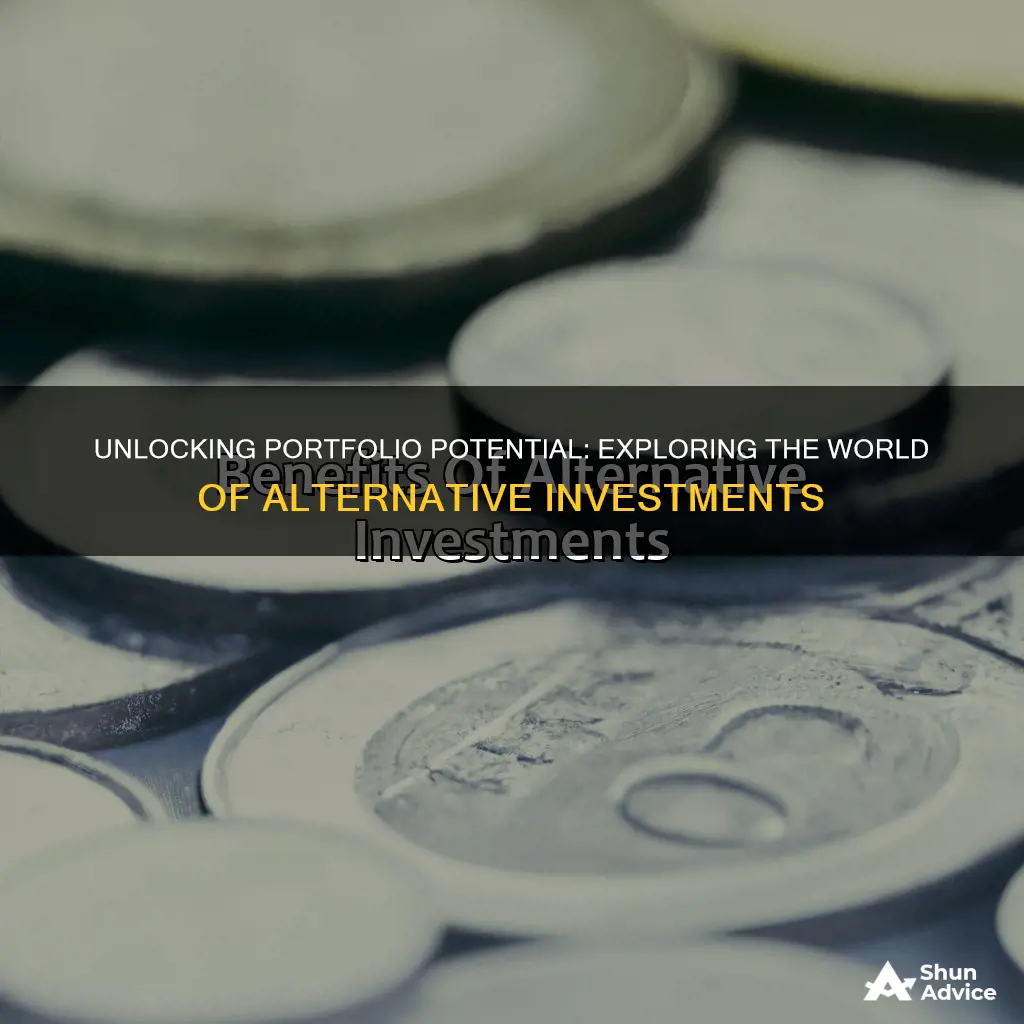
Alternative investments are a great way to diversify your portfolio and reduce your overall investing risk. They are financial assets that do not fall into the traditional categories of stocks, bonds, or cash. These include private equity, venture capital, hedge funds, managed futures, commodities, real estate, and more.
One of the key advantages of alternative investments is that they have a relatively low correlation with traditional asset classes, meaning their financial performance is often dissimilar to that of stocks and bonds. This makes them a good tool for diversifying your portfolio.
However, it's important to note that alternative investments are typically less liquid than traditional investments, making them harder to convert into cash quickly. They are also often unregulated and complex, requiring extensive due diligence.
| Characteristics | Values |
|---|---|
| Diversification | Alternative investments can be used to diversify a portfolio beyond traditional asset classes |
| Returns | Alternative investments have the potential for higher returns compared to traditional investments |
| Risk | Alternative investments are considered riskier than traditional investments |
| Regulation | Alternative investments are often unregulated by the SEC or other regulatory bodies |
| Liquidity | Alternative investments are typically illiquid and harder to convert into cash |
| Complexity | Alternative investments are often complex and difficult to understand |
| Accessibility | Alternative investments were traditionally only accessible to high-net-worth and institutional investors, but are becoming more accessible to retail investors |
What You'll Learn

Alternative investments can act as a hedge against inflation
Alternative investments can be a great way to protect your portfolio from the negative effects of inflation. Here are some ways in which they can act as a hedge:
- Low correlation with traditional assets: Alternative investments such as commodities, real estate, and gold tend to have a low correlation with traditional asset classes like stocks and bonds. This means that when the stock market is under pressure, these alternative investments may perform well, thus helping to offset losses in your portfolio.
- Diversification: The low correlation between alternative investments and traditional assets makes them a great tool for diversifying your portfolio. By including alternatives, you reduce the impact of market volatility on your investments.
- Inflation hedges: Certain alternative investments, like gold, oil, real estate, and infrastructure, can effectively hedge against inflation risk. These tangible assets tend to maintain or increase in value during inflationary periods.
- Adjustable revenue streams: Some alternative investments, such as real estate, offer adjustable revenue streams due to flexible lease terms and structures. As inflation increases, rents can be raised, providing a hedge against rising costs.
- Protection from rising interest rates: Alternative credit, such as senior loans, may outperform traditional fixed income during periods of rising interest rates. Senior loans have floating-rate coupons that reset upon issuance, allowing them to adapt to changing market conditions.
- Commodities as a hedge: Commodities like copper and semi-precious metals are expected to grow in demand and value as the world transitions to a lower carbon economy. Investing in these commodities can provide a hedge against inflation, as their value is often influenced by supply and demand dynamics rather than market behaviour.
Unveiling the Multifamily Home Investment Strategy: A Beginner's Guide
You may want to see also

They can offer higher returns than traditional investments
Alternative investments are financial assets that do not fall into conventional categories such as stocks, bonds, or cash. They include private equity, venture capital, hedge funds, real estate, commodities, and derivatives contracts. These types of investments are often considered riskier than traditional investments, but they offer the potential for higher returns.
- Higher Risk, Higher Returns: Alternative investments are generally considered riskier than traditional investments due to their complex nature, lack of regulation, and illiquidity. As a result, they often provide the potential for higher returns to compensate for the increased risk.
- Diversification Benefits: Alternative investments can help investors diversify their portfolios by offering access to markets and assets that are not available through traditional investments. By including alternative investments, investors can reduce their overall portfolio risk and potentially enhance returns.
- Low Correlation with Traditional Assets: Alternative investments tend to have a low correlation with traditional asset classes like stocks and bonds. This means that their performance may not be closely tied to the performance of the stock or bond market. As a result, alternative investments can provide a hedge against losses in traditional markets, leading to higher overall returns for investors.
- Inflation Hedge: Some alternative investments, such as commodities, gold, oil, or real estate, can serve as effective hedges against inflation. As the purchasing power of traditional currencies decreases during inflationary periods, the value of these tangible assets may increase, providing a hedge against inflation and potentially leading to higher returns.
- Flexibility and Specialty Options: Alternative investments come in various forms and structures, allowing investors to choose options that align with their preferences, risk appetite, and investment goals. This flexibility enables investors to seek out opportunities with higher return potential that may not be available in traditional investments.
While alternative investments offer the potential for higher returns, it is important to remember that they also come with higher risks and unique considerations. Investors should carefully evaluate their financial goals, risk tolerance, and time horizon before deciding to include alternative investments in their portfolios.
Wealthy Investing: Should They Continue?
You may want to see also

They can be a good diversification tool
Alternative investments are a great way to diversify your portfolio. They are financial assets that do not fall into the conventional categories of stocks, bonds, or cash. They can be a good diversification tool because they tend to have a low correlation with traditional assets. This means that if the stock market is doing poorly, some of your alternative investments could perform well.
- Private equity or venture capital
- Hedge funds
- Real estate
- Commodities
- Cryptocurrency
- Collectibles
It's important to note that alternative investments may come with higher risks, such as lack of regulation, lack of transparency, and high minimum investments. They may also be less liquid, meaning they cannot be easily converted into cash.
When considering alternative investments, it's crucial to do your due diligence and carefully evaluate your financial goals, risk tolerance, and investment horizon.
Retirement Investment Selection: Navigating the Complexities for a Secure Future
You may want to see also

They can be less liquid than traditional investments
Alternative investments are financial assets that do not fall into conventional categories such as stocks, bonds, or cash. They include private equity, venture capital, hedge funds, managed futures, commodities, real estate, and collectables like art and antiques.
One of the main drawbacks of alternative investments is their lack of liquidity. They are often less liquid than traditional investments, which means they can be more difficult to buy or sell. Here are some reasons why alternative investments are less liquid:
- Long lock-up periods and illiquidity: Many alternative investments have long lock-up periods, during which investors may not be able to redeem their investment for months or even years. This lack of liquidity can make it challenging for investors who need quick access to their money.
- Difficult to value: Alternative investments, especially unique assets like art or antiques, can be difficult to value accurately. This is because there may not be a clear market price, and valuations can vary widely depending on the appraiser.
- Limited buyer pool: Some alternative investments, such as rare collectibles or fine wine, may have a limited pool of potential buyers. This can make it more challenging to find a buyer when you want to sell.
- Lack of public regulatory filings: As many alternative investments are not regulated by the SEC, there is a lack of public regulatory filings, resulting in limited information for investors. This can make it challenging to assess the value and risks associated with these investments.
- High minimum investments: Alternative investments are typically designed for high-net-worth individuals or institutional investors. As a result, they often have high minimum investment requirements that can be prohibitive for smaller investors.
- Redemption restrictions: Some alternative investment funds, such as hedge funds, may impose redemption restrictions, such as gated redemptions or lock-up periods, which can limit investors' ability to withdraw their money.
- Complex structures and terms: Alternative investments can be complex, with structures and terms that are difficult for investors to understand. This complexity can make it challenging to assess the risks and liquidity of these investments.
While alternative investments offer potential benefits such as diversification and higher returns, investors should carefully consider the liquidity constraints and conduct thorough due diligence before investing.
Unveiling the Mystery: Calculating the Time for Your Investment to Double
You may want to see also

They can be more complex and risky than traditional investments
Alternative investments are more complex and riskier than traditional investments. They are financial assets that do not fall into conventional investment categories such as stocks, bonds, or cash. They include private equity, venture capital, hedge funds, managed futures, and collectibles like art and antiques.
Alternative investments are often more complex than traditional investments. They may have complex structures and terms that are challenging to understand, increasing the risk of making uninformed or inappropriate investment decisions. For example, some alternative investments may not have a readily available market price, making it difficult to determine their true value. The valuation of alternative investments can be highly subjective and depend on the appraiser.
Alternative investments also tend to be riskier than traditional investments. They often involve higher levels of risk and employ risky strategies like short selling or trading complex derivatives. The potential for high returns comes with higher risk. Many alternative investments are not registered with or regulated by the U.S. Securities and Exchange Commission (SEC), which further adds to their risk. The lack of regulation makes alternative investments more susceptible to investment scams and fraud.
Furthermore, alternative investments often have higher fees and expenses compared to traditional investments. Private equity and hedge funds, for instance, typically charge high management and performance fees, reducing investors' returns.
In addition, alternative investments are generally less liquid than traditional investments. They may have long lock-up periods, making it difficult for investors to recoup their initial investment quickly. Many alternative investments are also illiquid, meaning there may not be an active or large market for them, and selling them may incur significant transaction costs or loss of value.
Overall, while alternative investments offer potential benefits such as diversification and higher returns, they also come with increased complexity and risk.
Retirement Redefined: A Balanced Investment Portfolio for the Over-65s
You may want to see also
Frequently asked questions
Alternative investments are financial assets that do not fall into conventional categories such as stocks, bonds, or cash. They include private equity, venture capital, hedge funds, managed futures, commodities, real estate, and art and antiques.
Alternative investments can be a good way to diversify your portfolio. They generally have a low correlation to more traditional investments, which can help to reduce your overall investing risk. They can also offer higher returns than traditional investments.
Alternative investments are considered riskier than traditional investments. They are often illiquid, meaning they cannot be easily converted into cash, and may have high minimum investment requirements. They are also typically unregulated, which can result in a lack of transparency and make it difficult to value your investment.
You can buy alternative investments through crowdfunding apps, private funds, publicly traded investment trusts, or managed ETFs. If you are an accredited investor, you may also be able to access alternative investments through a standalone firm.







